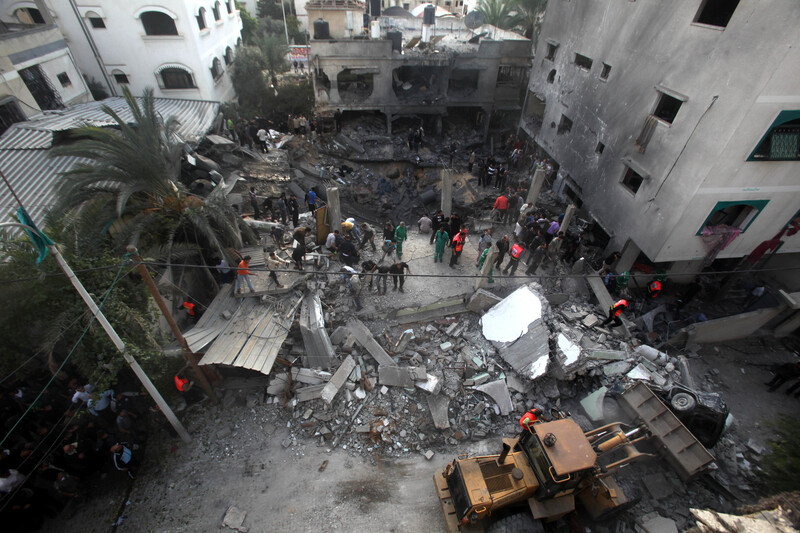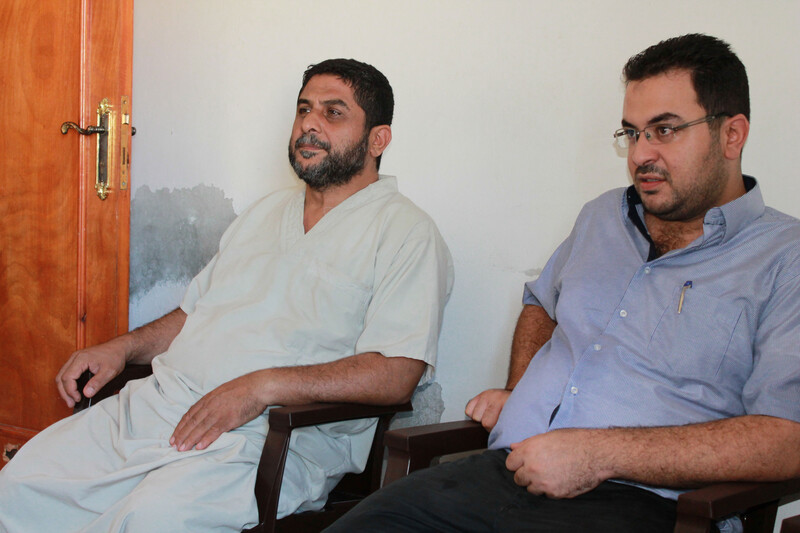The Electronic Intifada Gaza City 2 August 2013

Twelve persons — including ten members of one family — were killed when Israel bombed a three-story home in Gaza in November 2012.
APA images“All our lives, we’ve heard about negotiations and peace processes,” Jamal al-Dalou said Monday afternoon in his Gaza City apartment, hours before the latest round of talks between Israel and the Palestinian Authority began in Washington. “We’ve never seen them achieve anything.”
“What’s the meaning of negotiations if we are still killed by missiles from Israeli F-16s and Apaches?” he added. “What’s the meaning of negotiations if the Israelis keep stealing our land, our heritage and everything meaningful in our lives? What’s the meaning of negotiations if they besiege our land, sea and sky?
“The negotiations are lies. There are no such things.”
Around 2:30pm on 18 November 2012, an Israeli airstrike destroyed al-Dalou’s three-story house in the nearby al-Nasser neighborhood, killing ten members of his family and two neighbors. The victims included his 73-year-old sister, wife, two daughters, son, daughter-in-law and four grandchildren between the ages of one and seven, as well as a young man and an 83-year-old woman in the house next door.
Jamal and his son Abdullah had left the house shortly before the attack. “I went out to buy some food and drinks,” Jamal said. “We had been under siege for five days. Everyone was afraid to go outside, since anything that moved in the streets was a target for the Israeli warplanes. I also wanted to check on the store I run.
“After I had been gone for an hour, my neighbors began calling me. They told me to hurry back, because the Israelis had bombed my house and killed everyone inside it. I experienced the worst moments of my life then. Everything I had worked for was destroyed.”
Before Israel’s eight-day offensive against the Gaza Strip, Jamal’s son Ahmed lived in Turkey, where he was studying for a master’s degree in civil engineering.
“Our dreams, all gone”

Jamal (left) and Ahmed al-Dalou
“My friend called from Dubai,” Ahmed said on Monday. “He told me they had shelled an al-Dalou family near al-Nasser street and two or three homes had been damaged. At first I thought it was our relatives.
“I called my sister’s husband. He canceled the call. I called my father and my brother. They didn’t answer. Finally, I called my sister’s husband again. He answered screaming.”
After receiving the news of his family’s massacre, Ahmed returned to Gaza as quickly as he could. “I saw our home, our children, our dreams, all gone,” he said. “When I came, they were still searching for the bodies.”
“All the neighbors came to try to help civil defense remove the rubble and find any survivors,” Jamal said. He had lost consciousness when he heard that members of his family had been killed.
After he made his way home, “no one told me what had actually happened,” he said. “Everyone told me that my family was in the hospital. The next day, they started to tell me what had happened, but slowly — so they wouldn’t kill me from the shock.”
In the days that followed, Israel scrambled to explain why it had bombed a civilian home, killing a dozen persons and wounding at least nine more.
In the span of less than a month, it offered four conflicting justifications: that it had targeted Yehiya Rabiah, a member of Hamas’ military wing, the Izzedeen al-Qassam Brigades, unknown to the al-Dalou family; that it had meant to hit Rabiah, but struck the wrong house; that it had targeted Jamal’s son Mohammed, an officer with the Gaza security forces killed in the attack; and that it had never publicly named its objective, despite previous claims to the contrary (“Israeli military changes story about al-Dalou airstrike — for the fourth time,” Mondoweiss, 12 December 2012).
“Clear violation”
On 7 December, Human Rights Watch called the attack “a clear violation of the laws of war.”
“The Israeli claim that the attack on the al-Dalou home was justified is unsupported by the facts,” said Fred Abrahams, a Human Rights Watch special advisor who researched the case in Gaza. “The onus is on Israel to explain why it bombed a home full of civilians killing 12 people” (“Israeli airstrike on home unlawful,” 7 December 2012).
In April this year, Israel’s Military Advocate General ruled against an investigation of the attack, saying that “the incident does not raise suspicion of the commission of a criminal offense, and that the unfortunate result occurred despite the efforts made to minimize the collateral damage to uninvolved civilians” (“An examination of alleged misconduct during Operation ‘Pillar of Defense’ - an update,” 11 April 2013 [PDF]).
Amnesty International criticized the verdict, saying “the attack on the al-Dalou family home should be investigated as a possible war crime.”
Ann Harrison, Amnesty’s deputy program director for the Middle East and North Africa said, “Once again, the Israeli military is claiming to investigate itself and there is no way for the victims of the Israeli attacks and their relatives in Gaza or for human rights organizations to know that the [Israeli army’s] internal review is not simply giving soldiers time to coordinate their accounts of events, making justice even more unlikely” (“Israel’s military investigations into Gaza conflict violations strengthen impunity,” 17 April 2013).
“Empty promises”
Jamal, who had answered questions and provided documents for Human Rights Watch and the Gaza-based Al Mezan Center for Human Rights, described the outcome as “expected.”
“Where are the international courts?” he said. “We want them to take real actions, not offer empty promises. We want all of our rights. We will never negotiate over them.”
Gaza’s security forces arrested the a man accused of helping Israel target their house in March, Ahmed said. A military court is hearing his case.
The al-Dalou family were hit hardest by the November attacks. An investigation by the United Nations High Commissioner for Human Rights found that Israeli forces killed at least 168 Palestinians during the attacks. The commissioner stated that 101 of the victims were believed to be civilians, including 33 children and 13 women. Injuries in the “hundreds” went uncounted.
Two Palestinian demonstrators, as well as a twenty-month-old baby, were also killed in the West Bank at that time (“West Bank protests: Waiting for the tipping point,” Al-Akhbar English, 21 November 2012).
A third demonstrator, Arafat Jaradat, died under interrogation in Israel’s Megiddo prison on 23 February this year, apparently from torture.
“Something like what happened to us has happened to every Palestinian family,” Jamal said. “This life is not new for us.”
After a brief visit to Turkey, Ahmed and his wife returned to Gaza.
“I’m not thinking of going back to Turkey now,” he said. “It’s difficult to leave him [Jamal] alone, at least for the next two or three years.”
“We have a hard, empty life, especially during Ramadan,” Jamal said. “We were a big family. Ramadan used to have a unique taste. I remember taking my sons, my daughters, my wife and my grandchildren to the mosque to pray. The atmosphere at home was very special.
“Twenty days earlier, I had been at Mecca, doing the hajj [pilgrimage] with my wife. I was very happy to come home and brought a lot of gifts. I had also planned to buy more here.”
“We have to stop these people”
One of his sisters, who lived near the barrier separating Gaza from Israel, had come to the home in search of safety, Ahmed said. Two of his other daughters had planned to come that day, but were delayed dressing their children, Jamal added.
“We have to stop these people, to keep them from continuing like this,” Ahmed said. “In Turkey, we never bought Israeli products. My wife was shocked to find them for sale in Gaza, because people here have no choice but to buy them. I’m very happy to work on boycott campaigns.
“I’m not even following these negotiations. After twenty years, they’ve done nothing.”
“When people boycott Israel and stop importing their goods, that will change their policy,” Jamal added. “I’m grateful to people and governments who boycott Israel. It’s important to boycott Israeli products when we can get substitutes. If we can’t, what we can do?”
The al-Dalou family have received some aid from the authorities in Gaza and a great deal of support from the local community.
“We’re trying to forget, to start a new life,” Ahmed said. “We’re trying to continue. Life cannot stop. There is always something to do, to push you to keep going. I’ve found a job here, and am thinking of rebuilding our home.”
Jamal explained, “Psychologically, we have an advantage in Palestinian society. When something bad happens to anyone, all their friends and relatives will try to help them forget.”
And the determination of the refugee family remains undimmed.
“My family was expelled to Gaza in 1948. I want to live in peace. But I’m from Yaffa [Jaffa],” said Ahmed, referring to the Palestinian city that was ethnically cleansed by Zionist forces and is located in present-day Israel.
“This is our land,” Jamal said. “This is our grandparents’ land. That’s why we’re fighting for it. That’s why we’re still here.”
Joe Catron is a US activist in Gaza, Palestine. He co-edited The Prisoners’ Diaries: Palestinian Voices from the Israeli Gulag. He blogs at joecatron.wordpress.com and tweets at @jncatron.




